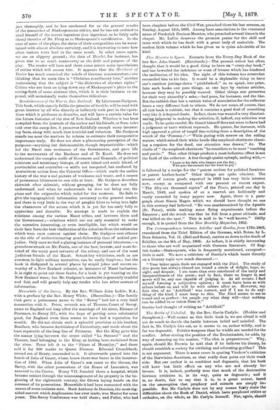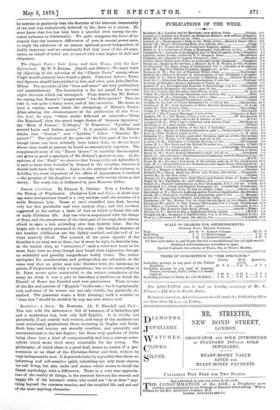The Battle of Unbelief. By the Rev. Gavin Carlyle. (Hodder
and Stoughton.)—Well meant as this little book is, we are afraid it will not do much to decide the battle between belief and unbelief. The fact is, Mr. Carlyle hits out, as it seems to us, rather wildly, and is far too dogmatic. Subtler weapons than he wields are needed for the conflict. After stating the position of the Evolutionists, he adds, by way of summing up the matter, "The idea is preposterous." Why, again, should Mr. Darwin be told that if he believes his theory, he should establish a society for civilising and educating gorillas ? This is not argument. There is some sense in quoting Virohow's criticism of the Darwinian doctrines, as that really does point out their weak side. But our author is so confident and dogmatic, that his book will have but little effect on any who are not already be' lievers. It is, indeed, perfectly true that much of the destructive German criticism is, in its way, quite as dogmatic ; and it is, no doubt, fair to say that it is, to a great extent, based on the assumption that prophecy and miracle are simply im- possible. But Mr. Carlyle does not by any means fairly state the difficulties about the Book of Daniel, which have perplexed critics as orthodox, on the whole, as Mr. Carlyle himself. Nor, again, should
he assume so positively that the doctrine of the inherent immortality of the soul was undoubtedly believed by the Jews as a nation. He must know that this has long been a question even among the sin- cerest believers in Christianity. We quite recognise the force of his remark that the immense differences of men in mental power seem to imply the existence of an unseen spiritual power independent of bodily structure, and we occasionally feel that some of the old argu- ments on behalf of belief are re:stated with some degree of skill and eloquence.



































 Previous page
Previous page